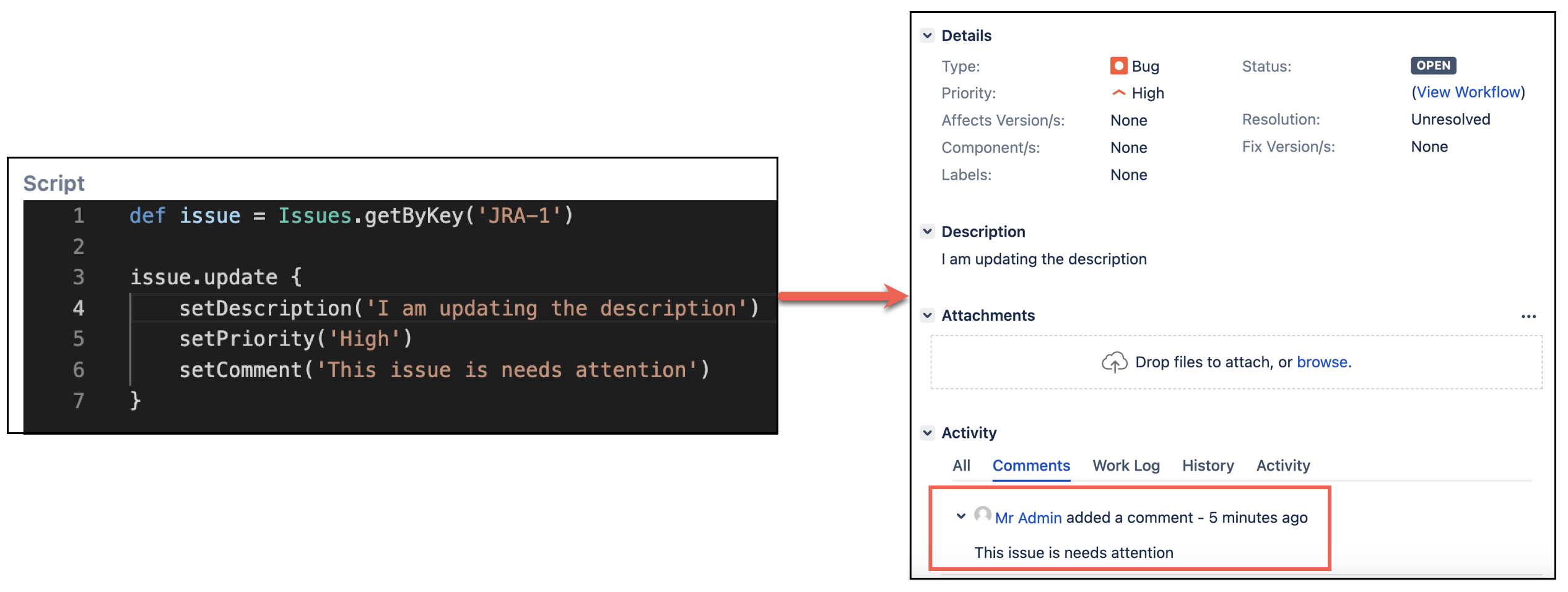Work with Comments
With HAPI, you can easily add comments to issues and restrict who can see the comments.
To work with comments in Jira Service Management see this page.
Adding a comment to an existing issue
You can add a comment to an existing issue. For example:
Issues.getByKey('SR-1').addComment('This is a comment')Adding a comment while updating an issue
You can add a comment while updating an issue. For example:
def issue = Issues.getByKey('SR-1')
issue.update {
setDescription('I am updating the description')
setComment('This is a comment')
}Adding a comment while transitioning an issue
You can add a comment while transitioning an issue. In this example we're resolving an issue, setting the resolution, and adding a comment:
def issue = Issues.getByKey('ABC-1')
issue.transition('Resolve Issue') {
setResolution('Done')
setComment('resolving this issue')
} Check out our Transitioning Issues documentation for more information on transitioning issues.
Update a comment
You can update an existing comment and the restrictions. For example:
def comment = Issues.getByKey('SR-1').addComment('Original comment')
comment.update {
setBody('Updated comment')
setGroupRestriction('jira-administrators')
}Retrieving comments from an issue
You may want to retrieve comments to, for example, display them in a dashboard or use them in a scripted field.
You can retrieve comments from an issue as follows:
groovydef issue = Issues.getByKey('SR-1') issue.comments
Overriding permissions while retrieving comments
The current user may not have the correct permissions to retrieve all comments from an issue. You can override permissions using getCommentsOverrideSecurity(). For example:
def issue = Issues.getByKey('SR-1')
issue.addComment('Adding a comment')
issue.getCommentsOverrideSecurity()Setting restrictions
Setting group restrictions
You can restrict which groups can see a comment. In this example we're adding a comment to an existing issue and restricting the comment to the "jira-administrators" group:
def issue = Issues.getByKey('SR-1')
issue.update {
setComment('This is a comment') {
setGroupRestriction('jira-administrators')
}
}Setting project role restrictions
You can restrict which project roles can see a comment. In this example we're adding a comment to an existing issue and restricting the comment to the "Administrators" role:
def issue = Issues.getByKey('SR-1')
issue.update {
setComment('This is a comment') {
setProjectRoleRestriction('Administrators')
}
}Deleting a comment
You can delete a comment from an existing issue using delete(). For example:
def comment = Issues.getByKey('SR-1').addComment('Adding a comment')
comment.delete()A Comment Deleted event is dispatched by default. You can use the closure below make sure this event is not dispatched.
def comment = Issues.getByKey('SR-1').addComment('Adding another comment')
comment.delete { dispatchEvent = false }Overwriting permissions while deleting a comment
The current user may not have the correct permissions to delete a comment. You can delete a comment from an existing issue regardless of the permissions of the current user using deleteOverrideSecurity. For example:
def comment = Issues.getByKey('SR-1').addComment('Adding a comment')
comment.deleteOverrideSecurity()


